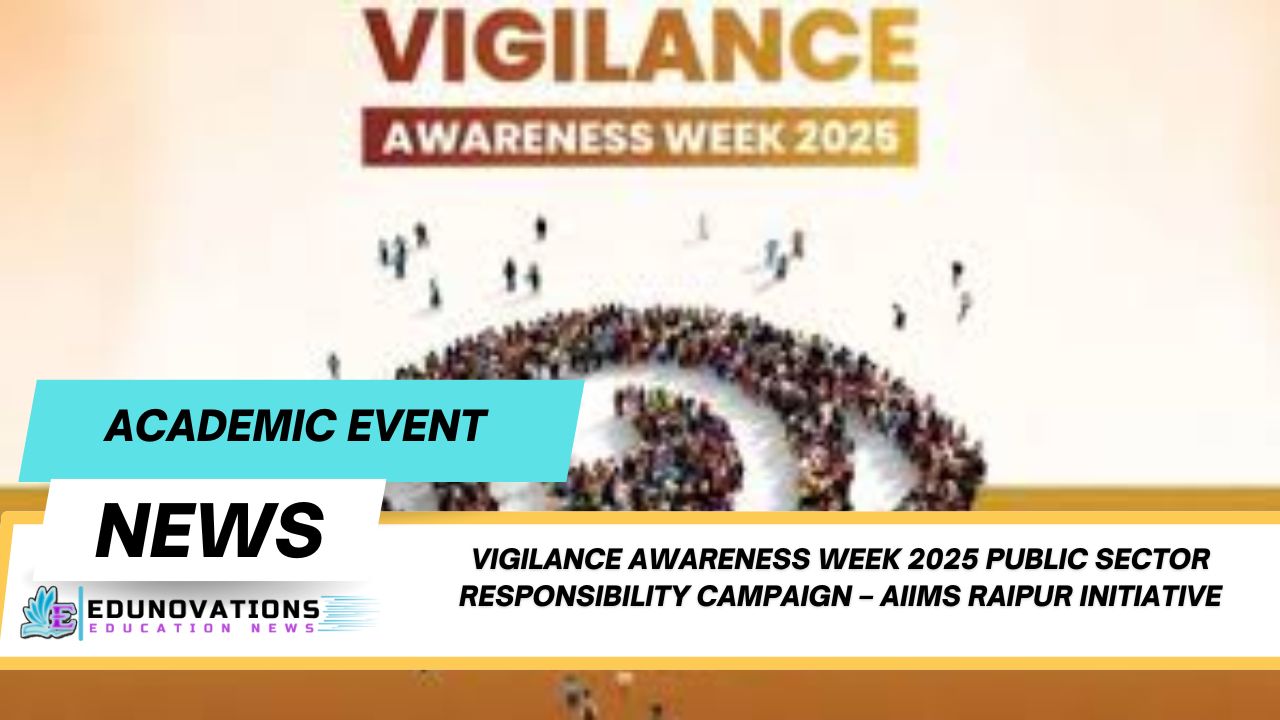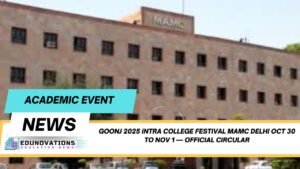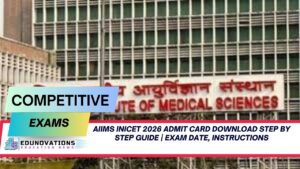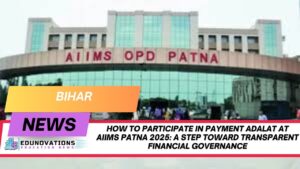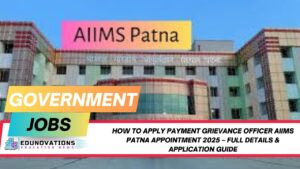AIIMS Raipur marked Vigilance Awareness Week 2025 with the theme “Vigilance: Our Shared Responsibility,” inspiring citizens and public servants to build an ethical, corruption-free India.
An Ethical Vision for India’s Public Institutions
In a remarkable display of civic commitment, the Vigilance Awareness Week 2025 public sector responsibility campaign was celebrated at the All India Institute of Medical Sciences (AIIMS) Raipur. The institution joined the nationwide initiative themed “Vigilance: Our Shared Responsibility,” organized from October 27 to November 2, 2025.
The campaign underscored India’s ongoing mission to promote transparency, accountability, and honesty within all levels of governance—especially in public healthcare institutions.
Dr Nitin M. Nagarkar, Director of AIIMS Raipur, inaugurated the event, reaffirming the institute’s unwavering stance on ethical medical governance. Faculty members, administrative staff, students, and healthcare professionals took the integrity pledge, committing themselves to fight corruption in every form.
A Week of Awareness and Action
The observance of Vigilance Awareness Week 2025 at AIIMS Raipur was not a ceremonial affair—it was a structured programme designed to educate, engage, and empower.
The schedule included:
- Integrity Pledge Ceremony: Staff and students pledged to uphold values of honesty and fairness.
- Poster Competitions: Creative campaigns on transparency in healthcare encouraged youth participation.
- Workshops and Lectures: Experts discussed institutional ethics, grievance redressal, and RTI best practices.
- Community Outreach Activities: Students and volunteers reached nearby localities to spread awareness about corruption-free governance.
Such activities amplified the vigilance awareness week 2025 initiative for citizens, making ethics education accessible beyond the walls of academia.
Why Vigilance Matters in Public Health Institutions
In healthcare institutions like AIIMS, vigilance is not merely a bureaucratic principle—it is a lifeline that ensures patient trust.
Mismanagement, favoritism, or procurement irregularities can directly affect lives. The vigilance awareness campaign in healthcare institutions India 2025 aims to address these systemic risks through internal audits, whistle-blower mechanisms, and citizen feedback channels.
According to Transparency International’s 2024 report, nearly 25 % of citizens perceive some form of corruption in public-health systems worldwide. By aligning with the theme “Vigilance: Our Shared Responsibility 2025 government awareness week,” AIIMS Raipur demonstrated that medical institutions can lead by example in ethical governance.
Promoting Shared Responsibility and Citizen Participation
The central message of this year’s campaign was the shared responsibility of all citizens.
Through interactive lectures, students were encouraged to see vigilance as a daily duty—reporting malpractices, insisting on transparency in service delivery, and participating in institutional audits.
The AIIMS Raipur Vigilance Officer highlighted that vigilance is not only a responsibility of government agencies but of every public servant and citizen who interacts with the system.
This mirrors the spirit of the “how to participate vigilance awareness week 2025 government institution” initiative promoted nationally by the Central Vigilance Commission (CVC).
Expert Insights: Upholding Integrity in the Public Sector
Former Central Vigilance Commissioner (K.V. Chowdary) once stated that “vigilance is not about suspicion—it’s about prevention.”
His words perfectly capture the essence of the Vigilance Awareness Week 2025 public sector responsibility campaign. Preventive vigilance focuses on identifying risk areas before corruption occurs, thereby saving resources and strengthening public trust.
Dr Nagarkar’s speech echoed similar sentiments:
“Our fight against corruption must be rooted in awareness and education. Each of us has a role in building a transparent ecosystem in healthcare.”
Such leadership-driven commitment aligns with India’s broader vision of Viksit Bharat 2047, where ethics and governance are inseparable.
Integrating Ethics in Academic Curriculum
AIIMS Raipur plans to integrate modules on ethics and transparency into its academic and administrative training programs.
Students pursuing MBBS, Nursing, and Paramedical courses will now have access to structured sessions on public administration ethics, whistle-blowing mechanisms, and procurement integrity.
The institution has collaborated with experts from national vigilance bodies to design a model that can later be replicated across other medical colleges in India.
For aspirants looking to understand government ethics and policies, students can also explore NCERT Courses and Current Affairs modules to connect theoretical learning with real-world practices.
Digital Tools and Transparency
The 2025 campaign also emphasized digital governance. Workshops introduced staff to e-procurement systems, online grievance redressal portals, and digital audit trails—steps essential to combating opacity.
AIIMS Raipur’s initiative showcases how digitization can strengthen vigilance across departments.
Institutions aiming to modernize their governance models can explore external tech support like Mart Ind Infotech, which specializes in web solutions for schools and government organizations.
Encouraging Youth and Community Engagement
The participation of young medical students was one of the campaign’s highlights.
Competitions such as “Ethical Innovations in Healthcare Administration” saw active participation from MBBS batches and nursing trainees.
Through debates, essays, and quizzes, students explored how corruption undermines patient trust and how they, as future doctors, could strengthen accountability.
Citizens were encouraged to join the campaign through local awareness drives, a critical component of the AIIMS Raipur vigilance awareness week 2025 initiative for citizens.
To supplement their learning, users can visit Notes, MCQs, and Videos for academic support material related to public administration, ethics, and governance.
Building an Ethical Future through Education
Experts argue that building vigilance in society starts with education. Incorporating integrity modules into public health curricula ensures that tomorrow’s doctors, nurses, and administrators become champions of ethical governance.
Learners can explore Syllabus, Free NCERT PDF Downloads, and Mind Maps to gain conceptual clarity on governance, ethics, and administrative reforms relevant to this campaign.
A Broader National Movement
Beyond AIIMS Raipur, government offices, PSUs, and academic institutions across India observed the week under the same theme.
The Central Vigilance Commission issued circulars encouraging organizations to conduct seminars, integrity pledges, and competitions on ethical governance.
This collective effort reinforces the idea that vigilance is not a one-week ritual but a continuous process.
By linking the theme vigilance our shared responsibility 2025 government awareness week with citizen participation, the government hopes to create a self-sustaining ecosystem of accountability.
Public Response and Media Recognition
Media coverage of AIIMS Raipur’s initiative was overwhelmingly positive. Local newspapers highlighted the creative ways in which medical students interpreted the theme.
Participants shared stories on social media using hashtags like #VigilanceWeek2025 and #SharedResponsibility, amplifying the message to a wider audience.
Public opinion surveys conducted by the institute suggested a noticeable increase in awareness about preventive vigilance among both staff and students—a sign that the campaign successfully resonated with its target groups.
A Step Toward Corruption-Free Governance
The Vigilance Awareness Week 2025 public sector responsibility campaign symbolizes India’s growing maturity in understanding that integrity is not merely compliance—it’s culture.
AIIMS Raipur’s model demonstrates how institutions can internalize vigilance values, encourage student participation, and extend awareness into communities.
As the campaign concluded with renewed commitment, the words of Director Nagarkar summed up its purpose:
“Our pledge for vigilance does not end today—it begins anew every day we serve the public.”
Toppers Use Mind Maps to score more than 95%
NCERT Class 11th Commerce Mind Maps
Add to cartOriginal price was: ₹999.00.₹199.00Current price is: ₹199.00.NCERT Class 12th Chemistry Mind Maps
Add to cartOriginal price was: ₹199.00.₹75.00Current price is: ₹75.00.NCERT Class 12th Commerce Mind Maps
Add to cartOriginal price was: ₹999.00.₹199.00Current price is: ₹199.00.NCERT Class 12th Science Mind Maps
Add to cartOriginal price was: ₹999.00.₹199.00Current price is: ₹199.00.NCERT Mind Maps For Class 10th
Add to cartOriginal price was: ₹999.00.₹199.00Current price is: ₹199.00.
Purchase Today
Frequently Asked Questions (FAQs)
1. What is the Vigilance Awareness Week 2025 public sector responsibility campaign?
It is a nationwide campaign promoting integrity and transparency in public institutions, observed annually under the Central Vigilance Commission.
2. What was the theme of Vigilance Awareness Week 2025?
The official theme was “Vigilance: Our Shared Responsibility.”
3. How did AIIMS Raipur participate in Vigilance Awareness Week 2025?
AIIMS Raipur organized pledge ceremonies, poster competitions, lectures, and outreach programmes involving staff, students, and citizens.
4. Why is vigilance important in public health institutions?
Because ethical governance ensures patient safety, transparency in procurement, and trust in public health services.
5. Who inaugurated the event at AIIMS Raipur?
Dr Nitin M. Nagarkar, Director of AIIMS Raipur, inaugurated the campaign.
6. How can citizens participate in Vigilance Awareness Week 2025?
Citizens can attend awareness events, take online integrity pledges, and promote vigilance practices in their workplaces.
7. What is the goal of the vigilance awareness campaign in healthcare institutions India 2025?
To educate medical professionals on ethical governance and ensure transparent institutional operations.
8. What role does the Central Vigilance Commission play?
The CVC coordinates and monitors the implementation of preventive vigilance measures across public institutions.
9. How does AIIMS Raipur plan to sustain vigilance practices post-2025?
By integrating ethics modules into student curricula and continuing awareness initiatives throughout the year.
10. Where can students learn more about public administration ethics?
Through resources such as NCERT Courses and Current Affairs platforms, which provide related study materials.

